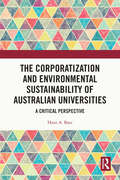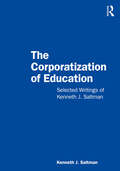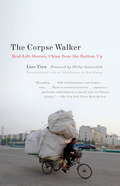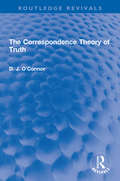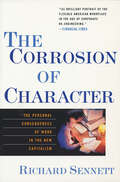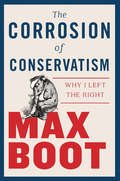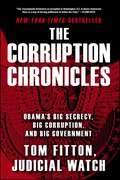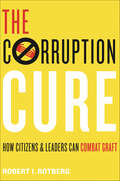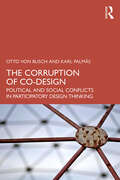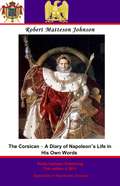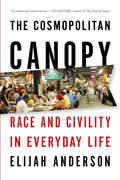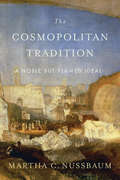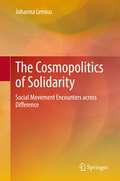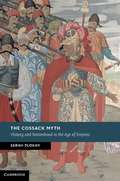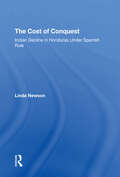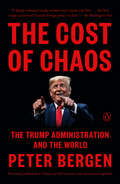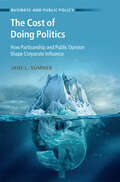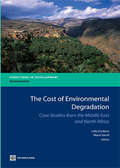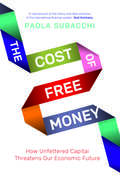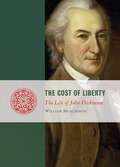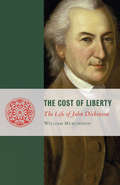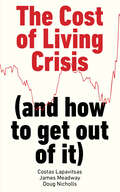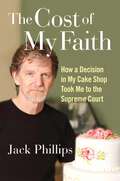- Table View
- List View
The Corporatization and Environmental Sustainability of Australian Universities: A Critical Perspective
by Hans BaerAnalysing the juxtaposition of two trends in universities – corporatisation and environmental sustainability – this book explores how they are more contradictory than compatible.Hans A Baer argues that this contradiction is unavoidable because of the capitalist parameters in which they operate, including a commitment to on-going economic growth which contributes to social inequality, environmental degradation, and greenhouse gas emissions. Drawing on archival sources and Baer’s experiences in university sustainability forums, the book exposes how what universities claim to do in relation to environmental sustainability compares with their research, educational, operational and institutional activities.Presenting a critique of and a radical alternative to the status quo, this book is suitable for academics and students of anthropology, environmental studies and higher education.
The Corporatization of Education: Selected Writings of Kenneth J. Saltman
by Kenneth J. SaltmanKenneth J. Saltman is a defining voice within Education, and for 25 years he has worked to uncover the ways in which public education has been impacted by corporatization and neoliberalism, and to demonstrate what educators and citizens can do to reclaim the democratic purpose of schooling. His work is unique in the way that it bridges a number of traditions, theoretical perspectives, and ranges in scope across the discipline, while at the same time translating crucial concepts in an accessible writing style.In this timely collection, Saltman introduces 11 of his most influential writings across his career with new contextual information for each piece. The volume is framed by a new introduction and conclusion by the author, which re-examine the scope of his work, discuss the larger development of the field over time, and considers what is still to be done.This important work will be crucial to researchers and graduate students in Education courses, particularly within Educational Foundations, Sociology of Education, and Education Policy Studies. The book’s interdisciplinary nature means that it will also be highly beneficial for those studying or researching within Sociology, Communications, and Politics.
The Corpse Walker
by Liao YiwuThe Corpse Walker introduces us to regular men and women at the bottom of Chinese society, most of whom have been battered by life but have managed to retain their dignity: a professional mourner, a human trafficker, a public toilet manager, a leper, a grave robber, and a Falung Gong practitioner, among others. By asking challenging questions with respect and empathy, Liao Yiwu managed to get his subjects to talk openly and sometimes hilariously about their lives, desires, and vulnerabilities, creating a book that is an instance par excellence of what was once upon a time called "The New Journalism." The Corpse Walker reveals a fascinating aspect of modern China, describing the lives of normal Chinese citizens in ways that constantly provoke and surprise.From the Trade Paperback edition.ws (conducted between 1990 and 2003) with sensitivity and patience, working both from notes and from his own memory of these remarkable conversations. The result is an idiosyncratic, powerful, and richly revealing portrait of a people, a time, and a place we might otherwise have never known.From the Hardcover edition.
The Correspondence Theory of Truth (Routledge Revivals)
by D. J. O'ConnorFirst published in 1975, The Correspondence Theory of Truth examines the simplest statements of empirical fact and establishes what we can mean when we say that such statements are true. In particular, the author has considered whether any or all of beliefs, sentences, statements, or propositions are properly said to be true or false. He proceeds to examine what we mean by the term ‘fact’ and what possible relation between facts and beliefs (or their linguistic embodiments) could be meant by the term ‘correspondence’. The second part of the book is a critical survey of important contemporary accounts of truth. The author examines Tarski’s semantic theory to see if it offers a satisfactory reconstruction of the essence of the traditional notion of correspondence, then J.L. Austin’s recent and famous version of the correspondence theory and some criticisms of it by Professor P. E. Strawson. A final chapter summarizes the viable content of the correspondence theory and suggests what problems about truth still remain for discussion if the theory is accepted. This book will be an essential read for students and scholars of Philosophy.
The Corrosion of Character: The Personal Consequences of Work in the New Capitalism
by Richard SennettA Business Week Best Book of the Year.... "A devastating and wholly necessary book."--Studs Terkel, author of Working In The Corrosion of Character, Richard Sennett, "among the country's most distinguished thinkers . . . has concentrated into 176 pages a profoundly affecting argument" (Business Week) that draws on interviews with dismissed IBM executives, bakers, a bartender turned advertising executive, and many others to call into question the terms of our new economy. In his 1972 classic, The Hidden Injuries of Class (written with Jonathan Cobb), Sennett interviewed a man he called Enrico, a hardworking janitor whose life was structured by a union pay schedule and given meaning by his sacrifices for the future. In this new book-a #1 bestseller in Germany-Sennett explores the contemporary scene characterized by Enrico's son, Rico, whose life is more materially successful, yet whose work lacks long-term commitments or loyalties. Distinguished by Sennett's "combination of broad historical and literary learning and a reporter's willingness to walk into a store or factory [and] strike up a conversation" (New York Times Book Review), this book "challenges the reader to decide whether the flexibility of modern capitalism . . . is merely a fresh form of oppression" (Publishers Weekly, starred review). Praise for The Corrosion of Character: "A benchmark for our time."--Daniel Bell "[A]n incredibly insightful book."--William Julius Wilson "[A] remarkable synthesis of acute empirical observation and serious moral reflection."--Richard Rorty "[Sennett] offers abundant fresh insights . . . illuminated by his concern with people's struggle to give meaning to their lives."--[Memphis] Commercial Appeal
The Corrosion of Conservatism: Why I Left The Right
by Max BootWarning that the Trump presidency presages America’s decline, the political commentator recounts his extraordinary journey from lifelong Republican to vehement Trump opponent. As nativism, xenophobia, vile racism, and assaults on the rule of law threaten the very fabric of our nation, The Corrosion of Conservatism presents an urgent defense of American democracy. Pronouncing Mexican immigrants to be “rapists,” Donald Trump announced his 2015 presidential bid, causing Max Boot to think he was watching a dystopian science-fiction movie. The respected conservative historian couldn’t fathom that the party of Lincoln, Roosevelt, and Reagan could endorse such an unqualified reality-TV star. Yet the Twilight Zone episode that Boot believed he was watching created an ideological dislocation so shattering that Boot’s transformation from Republican foreign policy adviser to celebrated anti-Trump columnist becomes the dramatic story of The Corrosion of Conservatism. No longer a Republican, but also not a Democrat, Boot here records his ideological journey from a “movement” conservative to a man without a party, beginning with his political coming-of-age as a young émigré from the Soviet Union, enthralled with the National Review and the conservative intellectual tradition of Russell Kirk and F. A. Hayek. Against this personal odyssey, Boot simultaneously traces the evolution of modern American conservatism, jump-started by Barry Goldwater’s canonical The Conscience of a Conservative, to the rise of Trumpism and its gradual corrosion of what was once the Republican Party. While 90 percent of his fellow Republicans became political “toadies” in the aftermath of the 2016 election, Boot stood his ground, enduring the vitriol of his erstwhile conservative colleagues, trolled on Twitter by a white supremacist who depicted his “execution” in a gas chamber by a smiling, Nazi-clad Trump. And yet, Boot nevertheless remains a villain to some partisan circles for his enduring commitment to conservative fiscal and national security principles. It is from this isolated position, then, that Boot launches this bold declaration of dissent and its urgent plea for true, bipartisan cooperation. With uncompromising insights, The Corrosion of Conservatism evokes both a president who has traduced every norm and the rise of a nascent centrist movement to counter Trump’s assault on democracy.
The Corruption Chronicles: Obama's Big Secrecy, Big Corruption, and Big Government
by Tom FittonWASHINGTON'S MOST CORRUPT: PRESIDENT BARACK OBAMA FLOUTING OF FEDERAL LAW * CORRUPTION * VIOLATING CAMPAIGN FINANCE REGULATIONS * TERRORIST TIES * VOTER REGISTRATION FRAUD * GOVERNMENT CON GAMES * EXTORTION BECAUSE NO ONE IS ABOVE THE LAW! In 2008, Barack Obama made a promise to have the "most transparent administration" of any U.S. president; it was the very cornerstone of his campaign. No secrets. No masks. No smoke and mirrors. No excuses. But over the next four years, President Obama's administration would prove to be one of the most guarded and duplicitous of our time. Tom Fitton of Judicial Watch, America's largest nonpartisan government watchdog (challenging George W. Bush as well as Bill Clinton), has been investigating Obama ever since he splashed onto the national scene in 2006. Now Fitton exposes devastating secrets the Obama administration has desperately fought--even in court--to keep from the American public. For a while, the Obama stonewall seemed to be holding. Until now. And the revelations are astonishing. Judicial Watch has unearthed the truth behind such high-profile issues as the bailouts, Obamacare, Guantanamo, Obama's true ties to Bill Ayers and to the Black Panthers voting intimidation scandal, and the Constitution-defying government czars. He reveals Obama's personal war against FOX News, his real link to ACORN, and his radical Chicago connections. Through scores of smoking-gun government files, some replicated here and many unearthed after lengthy court battles, Fitton also discloses the facts of the Obama-backed $535-million loan guarantee to Solyndra, promoted by the president as a model for economic recovery--only months before its disastrous bankruptcy filing. Here too is the truth behind the gunrunning scandal, code-named Fast and Furious, which was a program generated in secrecy by the U.S. government that supplied thousands of firearms to murderous criminals in Mexico--an unconscionable act, and only one in a series of historical lows for an administration that few, if any, major media in this country dare to expose. This book details how the Obama machine is aggressively employing Chicago-style tactics to steal, if necessary, the 2012 elections. And how Judicial Watch is prepared to go to court with historic lawsuits to make sure the elections are fair and honest. Why do Obama supporters turn a blind eye to his astoundingly unethical and abusive approach to governing this country? The Corruption Chronicles boldly, honestly, and factually makes the case that the federal government is now off the rails and out of control, and has literally built its foundation on broken promises, fatal miscalculations, and a cynical manipulation of its trusting public. But it's not over. Tom Fitton and Judicial Watch are proof that the Tea Party approach to government corruption can make a difference. A grassroots group can take on the president, the Congress, and the judiciary, and finally force the government to be held accountable. The uncontestable facts are here, in The Corruption Chronicles. To see what is true, you only have to look. THE FULLY DOCUMENTED FACTS BEHIND: * The Solyndra Debacle * Obama's Watergate: Operation Fast and Furious * The Obama Administration's $20 Billion Government Extortion Scheme * The Unprecedented Threat to the Integrity of the 2012 Elections * The Czar Investigation Stonewall * The Undermining of Our Nation's Immigration Laws * 9/11 Secrets
The Corruption Chronicles: Obama's Big Secrecy, Big Corruption, and Big Government
by Tom FittonWASHINGTON'S MOST CORRUPT: PRESIDENT BARACK OBAMA FLOUTING OF FEDERAL LAW * CORRUPTION * VIOLATING CAMPAIGN FINANCE REGULATIONS * TERRORIST TIES * VOTER REGISTRATION FRAUD * GOVERNMENT CON GAMES * EXTORTION BECAUSE NO ONE IS ABOVE THE LAW! In 2008, Barack Obama made a promise to have the "most transparent administration" of any U.S. president; it was the very cornerstone of his campaign. No secrets. No masks. No smoke and mirrors. No excuses. But over the next four years, President Obama's administration would prove to be one of the most guarded and duplicitous of our time. Tom Fitton of Judicial Watch, America's largest nonpartisan government watchdog (challenging George W. Bush as well as Bill Clinton), has been investigating Obama ever since he splashed onto the national scene in 2006. Now Fitton exposes devastating secrets the Obama administration has desperately fought--even in court--to keep from the American public. For a while, the Obama stonewall seemed to be holding. Until now. And the revelations are astonishing. Judicial Watch has unearthed the truth behind such high-profile issues as the bailouts, Obamacare, Guantanamo, Obama's true ties to Bill Ayers and to the Black Panthers voting intimidation scandal, and the Constitution-defying government czars. He reveals Obama's personal war against FOX News, his real link to ACORN, and his radical Chicago connections. Through scores of smoking-gun government files, some replicated here and many unearthed after lengthy court battles, Fitton also discloses the facts of the Obama-backed $535-million loan guarantee to Solyndra, promoted by the president as a model for economic recovery--only months before its disastrous bankruptcy filing. Here too is the truth behind the gunrunning scandal, code-named Fast and Furious, which was a program generated in secrecy by the U.S. government that supplied thousands of firearms to murderous criminals in Mexico--an unconscionable act, and only one in a series of historical lows for an administration that few, if any, major media in this country dare to expose. This book details how the Obama machine is aggressively employing Chicago-style tactics to steal, if necessary, the 2012 elections. And how Judicial Watch is prepared to go to court with historic lawsuits to make sure the elections are fair and honest. Why do Obama supporters turn a blind eye to his astoundingly unethical and abusive approach to governing this country? The Corruption Chronicles boldly, honestly, and factually makes the case that the federal government is now off the rails and out of control, and has literally built its foundation on broken promises, fatal miscalculations, and a cynical manipulation of its trusting public. But it's not over. Tom Fitton and Judicial Watch are proof that the Tea Party approach to government corruption can make a difference. A grassroots group can take on the president, the Congress, and the judiciary, and finally force the government to be held accountable. The uncontestable facts are here, in The Corruption Chronicles. To see what is true, you only have to look. THE FULLY DOCUMENTED FACTS BEHIND: * The Solyndra Debacle * Obama's Watergate: Operation Fast and Furious * The Obama Administration's $20 Billion Government Extortion Scheme * The Unprecedented Threat to the Integrity of the 2012 Elections * The Czar Investigation Stonewall * The Undermining of Our Nation's Immigration Laws * 9/11 Secrets
The Corruption Cure: How Citizens & Leaders Can Combat Graft
by Robert I. RotbergWhy leadership is key to ending political and corporate corruption globallyCorruption corrodes all facets of the world's political and corporate life, yet until now there was no one book that explained how best to battle it. The Corruption Cure provides many of the required solutions and ranges widely across continents and diverse cultures—putting some thirty-five countries under an anticorruption microscope—to show exactly how to beat back the forces of sleaze and graft.Robert Rotberg defines corruption theoretically and practically in its many forms, describes the available legal remedies, and examines how we know and measure corruption's presence. He looks at successful and unsuccessful attempts to employ anticorruption investigative commissions to combat political theft and venal behavior. He explores how the globe's least corrupt nations reached that exceptional goal. Another chapter discusses the role of civil society in limiting corruption. Expressed political will through determined leadership is a key factor in winning all of these battles. Rotberg analyzes the best-performing noncorrupt states to show how consummate leadership made a telling difference. He demonstrates precisely how determined leaders changed their wildly corrupt countries into paragons of virtue, and how leadership is making a significant difference in stimulating political anticorruption movements in places like India, Croatia, Honduras, and Lebanon. Rotberg looks at corporate corruption and how it can be checked, and also offers an innovative fourteen-step plan for nations that are ready to end corruption.Curing rampant corruption globally requires strengthened political leadership and the willingness to remake national political cultures. Tougher laws and better prosecutions are not enough. This book enables us to rethink the problem completely—and solve it once and for all.
The Corruption of Co-Design: Political and Social Conflicts in Participatory Design Thinking
by Otto von Busch Karl PalmåsDesigners are often depicted as social change agents that serve the good in the world. Similarly, co-design tends to be described as a democratic mode of creativity that is somehow beyond reproach. But is change a virtue in itself, and do participatory practices always produce socially beneficial outcomes? Such questions are becoming more pressing as co-design has emerged as a dominant practice in planning and urban design, while also informing corporate management and public administration. In this book, Otto von Busch and Karl Palmås suggest that designers tend to overemphasize the place of ideals in design, leaving them ill-equipped to deal with a social world of power-wielding and zero-sum games. Seeking to reorient the concerns of the Scandinavian tradition of participatory design, they suggest that co-design processes are rife with betrayals, decay, and corruption, and that designerly empathy has morphed into a new form of cunning statecraft. In putting forward Realdesign as an alternative conception of design practice, von Busch and Palmås ask: What hard lessons about the social must today’s designers learn from realists like Machiavelli?
The Corsican – A Diary of Napoleon’s Life in His Own Words: A Diary Of Napoleon's Life In His Own Words... ...
by Pickle Partners Publishing Napoleon I Emperor of the French Robert Matteson JohnsonThis ebook is purpose built and is proof-read and re-type set from the original to provide an outstanding experience of reflowing text for an ebook reader. Napoleon, died on the lonely island of St Helena in 1821, his life, his actions and thoughts have been written about, re-written and revised ever since. It is noticeable that Napoleon himself never left much in the way of works written by himself to record what he did or how he went about it, or to justify his methods or outline his plans. The works that emanated from St Helena, such as the Memorial, were written by those that shared his captivity and for their own purposes. That having been said Napoleon lived in a time without modern communication methods, leaving his vast empire to be run via the pen. Much that Napoleon wrote survived as a measure of this the official correspondence that he left behind is voluminous, running to 32 volumes in the initial edition published under the orders of Napoleon III, many other volumes were published thereafter. From this vast treasure-trove of information about the thoughts, actions and orders that Napoleon left, the American historian Robert Johnson reconstructed his book "The Corsican". The premise behind the books was to create a diary from Napoleon's own works and utterances as if it has been written contemporaneously by the Emperor himself. The result is an intriguing book which is faithful to the words of it's purported owner and includes the shifting themes of his life and his hopes and fears clearly. Fascinating reading. Text taken, whole and complete, from the 1910 edition, published in Boston and New York by Houghton Mifflin. Original - 546 pages. Author - Napoleon I - Emperor of the French 1769-1821 Editor - Robert Matteson Johnson 1867-1920 Linked TOC.
The Cosmopolitan Canopy: Race and Civility in Everyday Life
by Elijah AndersonFollowing his award-winning work on inner-city violence, , sociologist Elijah Anderson introduces the concept of the "cosmopolitan canopy"--the urban island of civility that exists amidst the ghettos, suburbs, and ethnic enclaves where segregation is the norm. Under the cosmopolitan canopy, diverse peoples come together, and for the most part practice getting along. Anderson's path-breaking study of this setting provides a new understanding of the complexities of present-day race relations and reveals the unique opportunities here for cross-cultural interaction. Anderson walks us through Center City Philadelphia, revealing and illustrating through his ethnographic fieldwork how city dwellers often interact across racial, ethnic, and social borders. People engage in a distinctive folk ethnography. Canopies operating in close proximity create a synergy that becomes a cosmopolitan zone. In the vibrant atmosphere of these public spaces, civility is the order of the day. However, incidents can arise that threaten and rend the canopy, including scenes of tension involving borders of race, class, sexual preference, and gender. But when they do--assisted by gloss--the resilience of the canopy most often prevails. In this space all kinds of city dwellers--from gentrifiers to the homeless, cabdrivers to doormen--manage to co-exist in the urban environment, gaining local knowledge as they do, which then helps reinforce and spread tolerance through contact and mutual understanding. With compelling, meticulous descriptions of public spaces such as 30th Street Station, Reading Terminal Market, and Rittenhouse Square, and quasi-public places like the modern-day workplace, Anderson provides a rich narrative account of how blacks and whites relate and redefine the color line in everyday public life. He reveals how eating, shopping, and people-watching under the canopy can ease racial tensions, but also how the spaces in and between canopies can reinforce boundaries. Weaving colorful observations with keen social insight, Anderson shows how the canopy--and its lessons--contributes to the civility of our increasingly diverse cities.
The Cosmopolitan First Amendment
by Timothy ZickWe live in an interconnected world in which expressive and religious cultures increasingly commingle and collide. In a globalized and digitized era, we need to better understand the relationship between the First Amendment to the United States Constitution and international borders. This book focuses on the exercise and protection of cross-border and beyond-border expressive and religious liberties, and on the First Amendment's relationship to the world beyond US shores. It reveals a cosmopolitan First Amendment that protects cross-border conversation, facilitates the global spread of democratic principles, recognizes expressive and religious liberties regardless of location, is influential across the world, and encourages respectful engagement with the liberty regimes of other nations. The Cosmopolitan First Amendment is the product of historical, social, political, technological and legal developments. It examines the First Amendment's relationship to foreign travel, immigration, cross-border communication and association, religious activities that traverse international borders, conflicts among foreign and US speech and religious liberty models, and the conduct of international affairs and diplomacy.
The Cosmopolitan Tradition: A Noble but Flawed Ideal
by Martha C. NussbaumThe cosmopolitan political tradition defines people not according to nationality, family, or class but as equally worthy citizens of the world. Martha Nussbaum pursues this “noble but flawed” vision, confronting its inherent tensions over material distribution, differential abilities, and the ideological conflicts inherent to pluralistic societies.
The Cosmopolitics of Solidarity: Social Movement Encounters across Difference
by Johanna LeiniusThis volume discusses how commonality and difference are negotiated across heterogeneous social movements in Latin America, especially Peru. It applies cosmopolitics as an analytical lens to understand the intricacies of social movement encounters across difference, without imposing colonial hierarchies or categorizations. The author blends multiple theoretical approaches—such as social movement research, postcolonial feminism, and post-foundational discourse theory—with ethnographic insights to develop a theory of cosmopolitical solidarity. Providing a transnational and intersectional perspective on the politics of social justice in a postcolonial context, this book will appeal to students of social movements, gender studies, racism, Latin American studies, and international relations, as well as practitioners involved in activism, social work, or international cooperation.
The Cossack Myth
by Serhii PlokhyIn the years following the Napoleonic Wars, a mysterious manuscript began to circulate among the dissatisfied noble elite of the Russian Empire. Entitled The History of the Rus', it became one of the most influential historical texts of the modern era. Attributed to an eighteenth-century Orthodox archbishop, it described the heroic struggles of the Ukrainian Cossacks. Alexander Pushkin read the book as a manifestation of Russian national spirit but Taras Shevchenko interpreted it as a quest for Ukrainian national liberation and it would inspire thousands of Ukrainians to fight for the freedom of their homeland. Serhii Plokhy tells the fascinating story of the text's discovery and dissemination unravelling the mystery of its authorship and tracing its subsequent impact on Russian and Ukrainian historical and literary imagination. In so doing he brilliantly illuminates the relationship between history, myth, empire and nationhood from Napoleonic times to the fall of the Soviet Union.
The Cost Of Conquest: Indian Decline In Honduras Under Spanish Rule
by Linda NewsonAt the time of the Spanish conquest, Honduras was inhabited by two distinct social systems, which defined the boundary between the cultures of Mesoamerica and South America. Each system was administered in a different way, and subsequently the survival of each civilization varied markedly. This study examines the nature of each culture at the time of Spanish conquest, the size of the populations, and the method of colonization applied to each. Particular attention is focused on Spanish economic activities and the institutions that directly affected the Indian way of life. Dr. Newson bases her findings on extensive archival research conducted in Spain, Guatemala, and Honduras and on archaeological, ethnographic, and linguistic evidence found in secondary sources.
The Cost of Chaos: The Trump Administration and the World
by Peter BergenFrom a preeminent national security journalist, an explosive account of Donald Trump's collision with the American national security establishment, and with the worldIt is a simple fact that no president in American history brought less foreign policy experience to the White House than Donald J. Trump. The real estate developer from Queens promised to bring his brash, zero-sum swagger to bear to cut through America's most complex national security issues, and he did. If the cost of his "America First" agenda was bulldozing the edifice of foreign alliances that had been carefully tended by every president from Truman to Obama, then so be it.Very quickly, it became clear to a number of people at the highest levels of government that their gravest mission was to protect America from Donald Trump. Trump and His Generals is Peter Bergen's riveting account of what happened when the unstoppable force of President Trump met the immovable object of America's national security establishment--the CIA, the State Department, and, above all, the Pentagon. If there is a real "deep state" in DC, it is not the FBI so much as the national security community, with its deep-rooted culture and hierarchy. The men Trump selected for his key national security positions, Jim Mattis, John Kelly, and H. R. McMaster, were products of that culture: Trump wanted generals, and he got them. Three years later, they would be gone, and the guardrails were off.
The Cost of Doing Politics: How Partisanship and Public Opinion Shape Corporate Influence (Business and Public Policy)
by Jane L. SumnerUsing quantitative and qualitative evidence, Sumner shows how consumer boycotts can work to dissuade companies from donating money to politicians, but may also encourage companies to attempt influence by largely invisible means. Boycotts do not work as many people expect – by threatening sales. Instead, Sumner shows how boycotts are less a statement of consumer behaviour than a way for people to signal their political inclinations, and they primarily hurt companies by tarnishing their reputation. Political influence is about building relationships, which means that companies have many more options for influence than just PAC contributions and formal lobbying. With these options available, companies can decide how to influence politics when they need to, and the tarnish of boycotts to a company's image can push some businesses to pursue options that are less noticeable to the public.
The Cost of Environmental Degradation
by Lelia Croitoru Maria SarrafHow much is a cleaner environment worth? For policy makers, that question used to go largely unanswered. Many economic activities cause environmental degradation, entailing real costs to the economy and to people's welfare. Knowing the extent of these costs is crucial for identifying a country's main environmental priorities and allocating appropriate funds for environmental protection. Over the past decade, the World Bank has initiated a systematic effort to measure the costs of environmental degradation in the Middle East and North Africa, shedding new light on their magnitude and on the need for policy changes. In many cases, these costs were found to be surprisingly large. 'The Cost of Environmental Degradation: Case Studies from the Middle East and North Africa' brings together the best case studies of this program and summarizes their policy impacts at the national and regional levels. The case studies quantify monetarily the annual damage due to environmental degradation and express these estimates as percentages of the countries' gross domestic product. The studies use the most recent environmental valuation methods to estimate the economic costs resulting from air pollution, water degradation, deforestation, and land degradation. Uniquely, the book dedicates a case study to value the costs of environmental degradation resulting from an oil spill and demolition waste in times of conflict. The studies then illuminate the concrete implications on policy, investments, and institutions for the respective nations. This book will be of interest to policy makers, nongovernmental organizations, and academic and research institutions.
The Cost of Free Money: How Unfettered Capital Threatens Our Economic Future
by Paola SubacchiA penetrating account of how unchecked capital mobility is damaging international cooperation, polarizing the economic landscape, and ultimately reshaping the global order When it comes to the afflictions of the global economy, almost everyone—and especially Donald Trump—is quick to point the finger of blame at the state of international trade. But what about unconstrained capital flows? Unfettered capital has resulted in a string of financial and economic crises that have left our political systems strained and dialogue corroded. The once perceived benefits of openness have been cast to the wayside and the cracks in the global order can no longer be ignored. Paola Subacchi argues that international cooperation and interdependence have become crippled. Regional restrictions will soon strengthen and a multipolar order will take shape, leading to a distinctly transformed economic landscape in which China challenges the dominance of the US dollar. Combining history, analysis, and prediction, this book provides penetrating insight into the challenges facing the international economic order.
The Cost of Liberty: The Life of John Dickinson
by William MurchisonThe Cost of Liberty offers a sorely needed reassessment of a great patriot and misunderstood Founder. It has been more than a half century since a biography of John Dickinson appeared. Author William Murchison rectifies this mistake, bringing to life one of the most influential figures of the entire Founding period, a principled man whose gifts as writer, speaker, and philosopher only Jefferson came near to matching. In the process, Murchison destroys the caricature of Dickinson that has emerged from such popular treatments as HBO&’s John Adams miniseries and the Broadway musical 1776. Dickinson is remembered mostly for his reluctance to sign the Declaration of Independence. But that reluctance, Murchison shows, had nothing to do with a lack of patriotism. In fact, Dickinson immediately took up arms to serve the colonial cause—something only one signer of the Declaration did. He stood on principle to oppose declaring independence at that moment, even when he knew that doing so would deal the &“finishing blow&” to his once-great reputation. Dubbed the &“Penman of the Revolution,&” Dickinson was not just a scribe but also a shaper of mighty events. From the 1760s through the late 1780s he was present at, and played a significant role in, every major assemblage where the Founders charted America&’s path—a claim few others could make. Author of the landmark essays Letters from a Farmer in Pennsylvania, delegate to the Continental Congress, key figure behind the Articles of Confederation and the Constitution, chief executive of both Pennsylvania and Delaware: Dickinson was, as one esteemed historian aptly put it, &“the most underrated of all the Founders.&” This lively biography gives a great Founder his long-overdue measure of honor. It also broadens our understanding of the Founding period, challenging many modern assumptions about the events of 1776 and 1787.
The Cost of Liberty: The Life of John Dickinson (Lives Of The Founders Ser.)
by William Murchison"Makes a powerful and convincing case for restoring John Dickinson to his rightful place in the first rank of the Founders." --The Washington Times The Cost of Liberty offers a sorely needed reassessment of a great patriot and misunderstood Founder. It has been more than a half century since a biography of John Dickinson appeared. Author William Murchison rectifies this mistake, bringing to life one of the most influential figures of the entire Founding period, a principled man whose gifts as writer, speaker, and philosopher only Jefferson came near to matching. In the process, Murchison destroys the caricature of Dickinson that has emerged from such popular treatments as HBO's John Adams miniseries and the Broadway musical 1776. Dickinson is remembered mostly for his reluctance to sign the Declaration of Independence. But that reluctance, Murchison shows, had nothing to do with a lack of patriotism. In fact, Dickinson immediately took up arms to serve the colonial cause--something only one signer of the Declaration did. He stood on principle to oppose declaring independence at that moment, even when he knew that doing so would deal the "finishing blow" to his once-great reputation. Dubbed the "Penman of the Revolution," Dickinson was not just a scribe but also a shaper of mighty events. From the 1760s through the late 1780s he was present at, and played a significant role in, every major assemblage where the Founders charted America's path--a claim few others could make. Author of the landmark essays Letters from a Farmer in Pennsylvania, delegate to the Continental Congress, key figure behind the Articles of Confederation and the Constitution, chief executive of both Pennsylvania and Delaware: Dickinson was, as one esteemed historian aptly put it, "the most underrated of all the Founders." This lively biography gives a great Founder his long-overdue measure of honor.
The Cost of Living Crisis: (and how to get out of it)
by Costas Lapavitsas Doug Nicholls James MeadwayA myth-busting pamphlet that charts a course out of the current cost of living crisis, focusing on Britain's current economic situationWe are living through a cost of living crisis, with interest rate hikes and the prices of everyday consumables and energy bills sky-rocketing. Why is this happening?Sometimes we are told that wages are too high, or that the government has "printed" too much money or that events far away, such as the war in Ukraine, are solely to blame. The plain argument that high prices go together with high profits, falling wages, and weak production is often distorted and hidden by mainstream commentary in the media and elsewhere.This plain-speaking pamphlet tells it straight: the big businesses dominating production and distribution make huge profits out of high inflation, while working people lose out. It sets out factual evidence to illustrate that the source of record profits is the fall in real wages as inflation rises.A large part of the income of working people is being transferred directly into the profits of big business. The pamphlet shows that the deeper roots of the "cost of living crisis" lie in the very low investment and poor productivity growth for many years. The basic steps to resolving the crisis are simple: prices, especially of essentials, must be brought down, and wages, salaries, benefits, and pensions must be increased.
The Cost of My Faith: How a Decision in My Cake Shop Took Me to the Supreme Court
by Jack PhillipsMaster cake artist and a man of profound faith, Jack Phillips found himself in the middle of one of the highest-profile religious freedom cases of the century. In July 2012, two men came to Jack Phillips's shop requesting a custom wedding cake celebrating their same-sex marriage. In a brief exchange, Jack politely declined the request, explaining that he could not design cakes for same-sex weddings but offered to design cakes for other occasions and to sell them anything else in his shop. Little did Jack know that his quiet stand for his Christian convictions about marriage would become a battle for the right of all Americans to live out their faith. Now, Jack Phillips shares his harrowing experience for the first time in this powerful new memoir. The Cost of My Faith is Jack&’s firsthand account from the frontlines of the battle with a culture that is making every effort to remove God from the public square and a government denying Bible-believing Christians the right to freely exercise their religious beliefs. Despite a Supreme Court victory in Masterpiece Cakeshop v. Colorado Civil Rights Commission, the fight to protect the right of Americans to freely exercise their beliefs is more critical than ever. The Cost of My Faith provides new insight into the case that shook the country and offers readers courage and inspiration to stand and live out their faith when facing their own battles.
